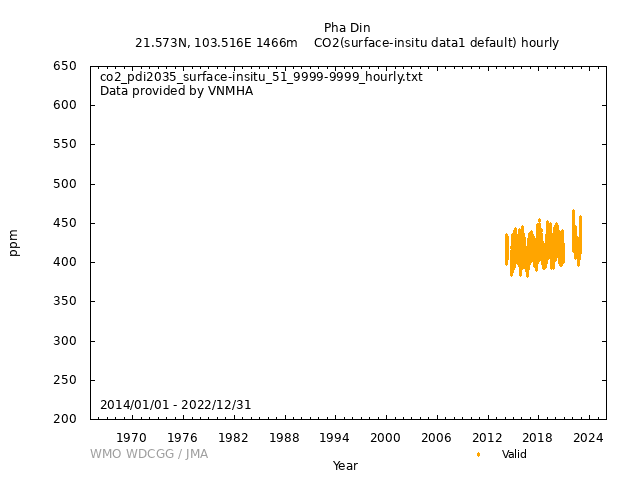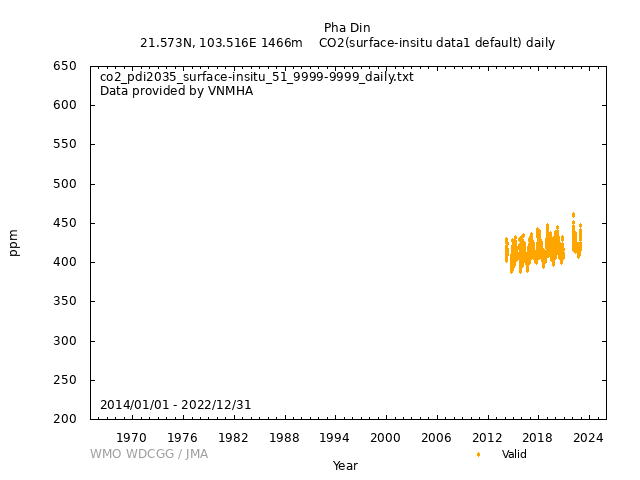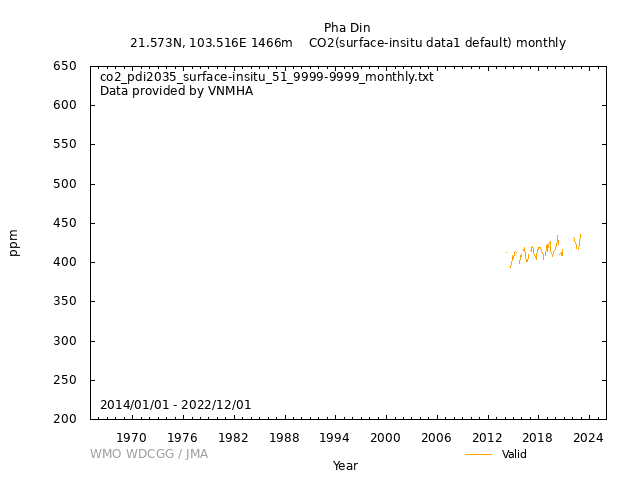Data Policy
GAW Data Policy
"For Scientific purposes, access to these data is unlimited and provided without charge.
By their use you accept that an offer of co-authorship will be made through personal contact with the data providers
or owners whenever substantial use is made of their data.
In all cases, an acknowledgement must be made to the data providers or owners and to the data centre when these data are used within a publication."
Version
2025-01-01-0051 (Last updated: 2024-12-24)File
This data set is submitted by VNMHA.
In line with the GAW Data Policy, users should contact the contributors of all data of interest and propose co-authorship or acknowledgement.
Organization
| NO | 51 |
|---|---|
| Acronym | VNMHA |
| Name | Viet Nam Meteorological and Hydrological Administration |
| Address 1 | |
| Address 2 | |
| Address 3 | No. 8 Phao Dai Lang street 100000 Ha Noi Viet Nam |
| Country/Territory | Viet Nam |
| Website | http://vnmha.gov.vn/ |
Contact(s)
| Name | Martin Steinbacher |
|---|---|
| Prefix | Dr. |
| martin.steinbacher@empa.ch | |
| Organization No | 23 |
| Organization acronym | Empa |
| Organization name | Swiss Federal Laboratories for Materials Science and Technology |
| Organization country/territory | Switzerland |
| Address 1 | Ueberlandstrasse 129 |
| Address 2 | CH-8600 Duebendorf |
| Address 3 | Switzerland |
| Country/territory | Switzerland |
| Tel | +41 58 765 4048 |
| Fax | |
| Last updated date | 2025-10-02 |
| Name | Nguyen Nhat Anh |
|---|---|
| Prefix | |
| anhnnhn@gmail.com | |
| Organization No | 51 |
| Organization acronym | VNMHA |
| Organization name | Viet Nam Meteorological and Hydrological Administration |
| Organization country/territory | Viet Nam |
| Address 1 | No. 8 Phao Dai Lang street |
| Address 2 | 100000 Ha Noi |
| Address 3 | Viet Nam |
| Country/territory | Viet Nam |
| Tel | +84905881618 |
| Fax | |
| Last updated date | 2023-08-22 |
|
|||||||
| Monitoring background conditions, and the influence of air pollution | |||||||
| UTC | |||||||
| ppm | |||||||
|
9999-12-31 00:00:00 - 9999-12-31 23:59:59: WMO CO2 X2019 |
|||||||
|
9999-12-31 00:00:00 - 9999-12-31 23:59:59: Picarro Inc., G2401, S/N CFKADS2028(CRDS) |
|||||||
|
9999-12-31 00:00:00 - 9999-12-31 23:59:59: 12 (m) |
|||||||
| 1 second | |||||||
|
The analyzer is regularly calibrated with four reference gases. All assigned mole fractions were initially reported on the WMO CO2 X2007 scale. In July 2021, all data were reprocessed and (re-)submitted and, since then, the whole time series is traceable to the WMO CO2 X2019 scale. Data 2020 and onwards were directly processed using the X2019 assignments of the reference gases, earlier data were converted using the equation X2019 = 1.00079 * X2007 - 0.142 as given on the CCL (NOAA GML) webpage. The quality of the calibration is verified with a fifth reference gas (target cylinder). Four calibration tanks are measured every 3 to 6 days. Two of them are tanks purchased from and pre-pared by the GAW Central Calibration Laboratory for CO2 (NOAA ESRL). The other two calibration gases are prepared by Empa (Switzerland) and their mole fractions were determined by the GAW World Calibration Centre for CH4, CO2, CO and surface O3 (WCC-Empa). WCC-Empa also assigned the mole fractions of an additional target cylinders that is measured every 25 hours for quality control. |
|||||||
| Quality assurance procedures involve time series plots, target tank (i.e. cylinders containing natural air with assigned gas mole fractions that are treated as (unknown) sample in a sequence of analyses) measurements, evaluation of the evolution of the instrument sensitivity, and consistency checks. The measurements were made in humid air, and a water vapour correction was applied. See Rella et al. (Rella, C.W., et al., High accuracy measurements of dry mole fractions of carbon dioxide and methane in humid air. Atmos. Meas. Tech., 2013. 6 (3): p. 837-860.) for details of the empirical determination of the correction parameters. | |||||||
|
[Hourly] high-resolution data are aggregated to 1min averages before hourly averages are calculated. Thus, ND (the number of detections) refers to the number of available 1min averages within the respective hour. A minimum of 20 1-min averages needs to be available to calculate hourly averages; otherwise, hourly data are reported as not available. [Daily] hourly averages are aggregated to daily means. Thus, ND (the number of detections) refers to the number of available hourly averages within the respective day. A minimum of 8 hourly averages needs to be available to calculate daily averages; otherwise, daily data are reported as not available. [Monthly] daily data are aggregated to monthly means. Thus, ND (the number of detections) refers to the number of available daily averages within the respective month. A minimum of 10 daily averages needs to be available to calculate monthly averages; otherwise, monthly data are reported as not available. |
|||||||
| Operational/Reporting | |||||||
|
Pha Din is located on a hill in north-western rural Viet Nam above the surrounding forests. Population: No residents at the station except for the custodians. No relevant residential areas within 10-20 km, except for sparse individual farm houses. The closest farm house is located in 1 km distance in NE direction. Land cover: Mountain hill area covered with forest. The station itself is above the canopy. Possible influence of local and regional emissions: Occasional corn plant burning in March and April. Staff housing (gas cooking, electrical heating, occasional trash burning) is at the station. No coal power plants and other industrial activities in the region. Prevailing wind directions: NE in winter and SW in summer. Temperature: 25-30 ºC in summer and down to 3 ºC in winter. No snow or ice in winter. Rainfall and humidity: The site is in clouds a considerable fraction of the year with a correspondingly high relative humidity all year long. Access: Pha Din is reachable all year long via a paved mountain road (8 h by car from Ha Noi city via Son La). After heavy rainfalls the roads may be blocked due to landslides. Facilities: The station represents a Level 3 NHMS meteorological station since September 2011 provid-ing manual readings every 6 hours for wind and wind speed. The laboratory building provides air-conditioned laboratory space and also basic accommodation for station operators and guest research-ers. The station is permanently occupied with 3 staff persons. CO2 observations are performed with a commercially available instrument (Picarro Inc., G2401) based on the Wavelength-Scanned Cavity Ringdown Spectroscopy technique coupled to a custom-built calibration unit. Along with CO2, the instrument is also capable to measure CH4, CO and H2O. Thus, the CO2 data can be corrected for interferences of water vapor. Therefore, no drying is applied prior to analysis and CO2 dry air mole fractions are determined by application of an empirical humidity correction to analysis data of the fully unaltered humid gas stream accounting dilution and pressure broadening effects. The humidity correction function was determined on-site last time in February 2014. tubing material: Dekabon/Synflex 1/4" OD; total inlet length approx. 21m; flow rate into lab: 5 lpm; no drying prior to analysis; dry air mole fractions are determined by applying an empirical humidity cor-rection (see below). Installation and operation were supported by the Federal Office of Meteorology and Climatology MeteoSwiss through the project Capacity Building and Twinning for Climate Observing Systems (CATCOS) between the Swiss Agency for Development and Cooperation (SDC) and MeteoSwiss. Since the end of the CATCOS programme in March 2017 and minor follow-up support through the GCOS Trust Fund until March 2021, Swiss support is mainly ensured through the Quality Assurance / Science Activity Centre Switzerland (QA/SAC-CH), supported by MeteoSwiss and run by Empa. |
|||||||
|
Wind direction: Wind speed: Relative humidity: Precipitation amount: Air pressure: Air temperature: Dew point temperature: Sea water temperature: Sea surface water temperature: Sea water salinity: Sea surface water salinity: |
|||||||
|
Meteorological data may remain as first provided, even when greenhouse gas data are updated. |
DOI Metadata
| DOI |
|
||||||||||||
|---|---|---|---|---|---|---|---|---|---|---|---|---|---|
| Version |
2025-01-01-0051 (Data Version History) * DOIs and file names may have multiple versions. Be sure to check the data version. |
||||||||||||
| Title | Atmospheric CO2 at Pha Din by Viet Nam Meteorological and Hydrological Administration, dataset published as CO2_PDI2035_surface-insitu_VNMHA_data1 at WDCGG | ||||||||||||
| Creator |
Viet Nam Meteorological and Hydrological Administration Martin Steinbacher (Empa) Nguyen Nhat Anh (Empa) |
||||||||||||
| Publisher | World Data Centre for Greenhouse Gases | ||||||||||||
| Publication Date | 2018-07-20 (Last Updated: 2024-12-24) | ||||||||||||
| Format | Text (WDCGG Data Format Table, WDCGG Meteorological Data Format Table), NetCDF | ||||||||||||
| Relation List (Is Part Of) |
All CO2 data contributed to WDCGG by GAW stations and mobiles by 2025-09-17 All CO2 data contributed to WDCGG by GAW stations and mobiles by 2024-09-24 All CO2 data contributed to WDCGG by GAW stations and mobiles by 2023-09-13 All CO2 data contributed to WDCGG by GAW stations and mobiles by 2022-09-07 All CO2 data contributed to WDCGG by GAW stations and mobiles by 2021-09-08 All CO2 data contributed to WDCGG by GAW stations and mobiles by 2020-09-28 All CO2 data contributed to WDCGG by GAW stations and mobiles by 2019-09-19 All CO2 data contributed to WDCGG by GAW stations and mobiles by 2018-10-25 |
||||||||||||
| Geolocation Point |
|
GAW Data Policy
"For Scientific purposes, access to these data is unlimited and provided without charge.
By their use you accept that an offer of co-authorship will be made through personal contact with the data providers
or owners whenever substantial use is made of their data.
In all cases, an acknowledgement must be made to the data providers or owners and to the data centre when these data are used within a publication."
Citation format
This format is an example of the WDCGG standard citation.
Please follow the citation format which the data providers or owners indicate.
Please follow the citation format which the data providers or owners indicate.
Martin Steinbacher (Empa),
Nguyen Nhat Anh (VNMHA),
Atmospheric CO2
at Pha Din by Viet Nam Meteorological and Hydrological Administration,
dataset published as CO2_PDI2035_surface-insitu_VNMHA_data1 at WDCGG,
ver. 2025-01-01-0051, https://doi.org/10.50849/WDCGG_0051-2035-1001-01-01-9999 (Reference date*: YYYY/MM/DD)
* As the reference date, please indicate the date you downloaded the files.
* As the reference date, please indicate the date you downloaded the files.
Reference(s)
| 1 |
For a short summary see Trinh Lan Phuong and Duong Hoang Long, Greenhouse gases measurements in Viet Nam, in Asia-Pacific GAW on Greenhouse Gases Newsletter vol 5, 33 - 38, 2014. available at http://www.wmo.int/pages/prog/arep/gaw/documents/The_5th_Asia_Pacifi_Newsletter_on_Greenhouse_Gases.pdf. |
|---|---|
| 2 |
Some data are also presented in Nguyen D.-L., H. Czech, S. M. Pieber, J. Schnelle-Kreis, M. Steinbacher, J. Orasche, S. Henne, O. B. Popovicheva, G. Abbaszade, G. Engling, N. Bukowiecki, N.-A. Nguyen, X.-A. Nguyen, R. Zimmermann, 2021. Carbonaceous aerosol composition in air masses influenced by large-scale biomass burning: a case-study in Northwestern Vietnam, Atmospheric Chemistry and Physics, 21 8293–8312, https://doi.org/10.5194/acp-21-8293-2021. |
| 3 | Pieber S. M., S. Henne, N. A. Ngyuen, D. L. Ngyuen, M. Steinbacher, 2023, Trace gases and air quality in Northwestern Vietnam during recurrent biomass burning on the Indochina Peninsula since 2014 – Field Observations and Atmospheric Simulations, In Vegetation Fires and Pollution in Asia, edited by K. P. Vadrevu, T. Ohara and C. Justice, pp. 545-558. Springer, Cham, Switzerland, https://doi.org/10.1007/978-3-031-29916-2 . |






